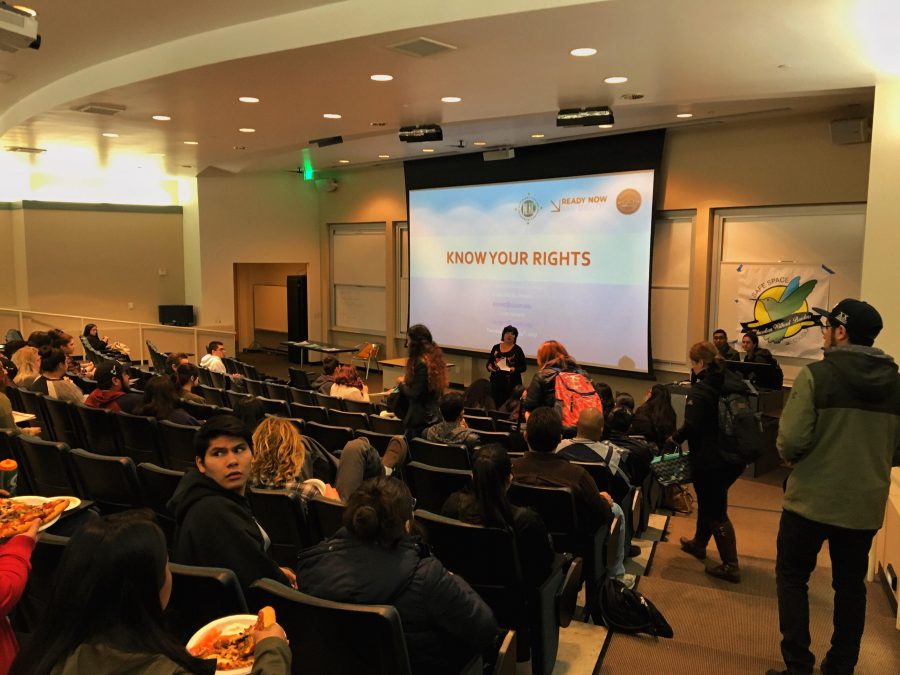CSUSM offers guidance and support for undocumented students
February 12, 2017
Under the Trump Administration, many are concerned about immigration rights, particularly on how new laws could apply to college campus communities.
Undocumented students have some protections due to the Deferred Action for Childhood Arrivals (DACA), a policy enacted in 2012 under the Obama administration.
Not every undocumented student is a DACA recipient — or “Dreamer.”
California Assembly Bill 540 allows financial support for undocumented students regardless of DACA status. It is unclear how any changes to federal law might impact California and the CSU system.
Dr. Deborah Kang of the History Department said she wanted to host an event focusing on how to help and support undocumented individuals.
Faculty members, the National Latino Research Center, the Office of Diversity, Educational Equity and Inclusion, Movimiento Estudiantil Chicanx de Aztlán (MeCHA) and Standing Together as oNe Dream (STAND), helped organize the Jan. 24 event.
The National Latino Research Center’s Dr. Arecela Nunez-Alvarez and Lilian Serrano lectured immigrant rights.
Regardless of someone’s status, they each said, an individual has rights that extend from the Bill of Rights and these rights apply no matter where you are within the United States.
“If you are stopped by ICE (Immigration and Customs Enforcement), they must have a warrant with your information to legally detain you,” Serrano said.
If detained, demand an immigration lawyer and remain silent, make sure to have that lawyer’s contact information available and have proper identification, the speakers advised. Having identification papers from another country could be problematic — a sign of one’s status. Don’t sign paperwork without a lawyer you may inadvertently waive your right to stay in the U.S. by signing a voluntary departure agreement, they said.
Serrano said the California Truth Act requires law enforcement to inform an individual that speaking with ICE is voluntary.
Organizations like STAND offer students, regardless of their status, support to accomplish their “goals and dreams, though the path may be difficult,” said STAND President Julio Villa. He encouraged students to attend to meetings no matter their status.
Dr. Michelle Ramos-Pellicia presented on a resolution passed by Academic Senate that offers support. It establishes that the “Academic Senate CSUSM stands in support of undocumented students … [it calls for] the establishment of a task force to articulate and address needs of undocumented students … [and] completion of ‘Education Without Borders’ training provided by STAND.”
The resolution was approved Dec. 7 with only one vote of opposition.
With DACA repeal possible (and a Trump executive order expanding ICE being signed just a day after the lecture), Dr. Nunez-Alvarez and Serrano reminded audience members that being vigilant and creating a plan if DACA is eliminated or ICE confronts you is key.
In September, the University Police Department released a letter to the campus explaining the CSU system policy regarding ICE: The department will not detain nor question individuals based on suspicions and will not enter into enforcement agreements with immigration agencies.
During a spring 2016 job fair, students protested the presence of ICE recruiters, which alarmed some students concerned about their safety. Some questioned the agency’s presence as it seemed to put the employment opportunities with ICE over the safety of students.
Since this incident, UPD has worked on improving its relationship with students and being more transparent about such events, UPD officials said. They have expressed both in the fall 2016 letter and in interview that they want students to feel safe on campus and know that they are safe within UPD regardless of status.
The policy can be found at http://www.csusm.edu/police/ice.html.


